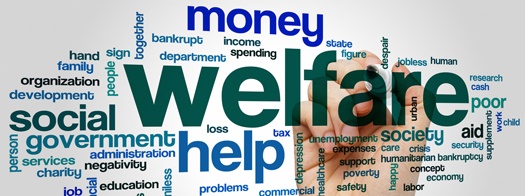How Bad Beliefs...
On August 22, 1996 President Bill Clinton signed into law legislation that replaced Aid to Families with Dependent Children with Temporary Assistance for Needy Families. The new bill was supposed to reform welfare. At that time, most Americans believed that poverty was the fault of the poor and that it wasn’t fare for hard working people to be burdened with supporting “freeloaders”. Welfare had become a dirty word. TANF was designed to counter this objection by adding a work requirement to the welfare eligibility requirements. Now social workers are required to help anyone who can work to find a job and only approve welfare assistance when it is clear to the social worker that no job is available.
This work requirement in TANF did lead to an increase in the number of single mothers who worked, but it also led to an increase in the numbers of people who could not get welfare anymore and who could not find a job.
Can Lead to Bad Policy
According to the most recent data available, TANF roles are now down to about 850,000 adults with their 2.5 million children – a whopping decline of 75% from 1996. As of 2012, roughly 3 million American children spend at least three months in a calendar year living on virtually no money. The number of families dependent on food pantries is the highest ever recorded, and the number of people giving blood plasma in exchange for cash has tripled in the last decade.
TANF was meant to “replace” AFDC, but what it did in reality was essentially kill the U.S. cash welfare system. John Kasich, Ohio’s Governor and a recent Presidential candidate is quoted as saying, “States, not social workers, are using TANF to close the holes in their budgets.”
Jeb Bush, Florida’s Governor and another Presidential candidate, says, “The decades-long ‘War on Poverty’, while well intentioned, has been a losing one. And the casualties can be counted in the millions who never had the chance at work and whose families fell victim to drugs, violence, and the crushing of the spirit.”
Only When We Change Beliefs...
Americans tend to blame the poor and unemployed themselves, and not external economic factors, for their circumstances. If we are going to make progress against poverty, we have to change views about what government programs have accomplished, and we have to change views about why people are poor. This requires a new appreciation of how the economy, globalization, technological change and employer practices have contributed to our era of rising inequality.
Poverty is high because of the failure of the economy to benefit the average worker, not because of government programs - but I'm sure we can see how some government programs contribute to the problem.
Can We Change the Policy
One of our colleagues who has worked in the welfare system for 25 years offered this insight.
“Poverty, after all, is the natural state of man. Throughout most of human history, man has existed in the most meager of conditions. Prosperity, on the other hand, is something that is created. While we must continue to provide a safety net for families falling into dire straits, as a society we must look deeper into the economic and sociological roots of this social disease. Poverty is not a failure to succeed on the part of an individual, but rather a social condition that most are born into and cannot rise above without assistance.”


